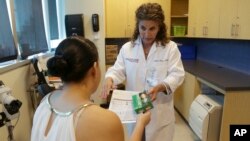Three experimental Zika vaccine candidates have completely protected rhesus macaque monkeys from infection, scientists announced Thursday, and human clinical trials of one of the vaccines are set to begin this fall.
Researchers at the Walter Reed Army Institute of Research in Maryland and Harvard University in Boston said in June that they had developed two vaccines against Zika that protected mice. Since then, a third vaccine, using a harmless cold virus, has been developed, and all of them shielded nonhuman primates against the mosquito-borne virus in experiments reported this week in the journal Science.
“It’s really predictive of how things will work in humans, and that’s why we’re so excited,” said Nelson Michael, director of Walter Reed’s HIV Research Program and co-author of the paper.
One of the vaccines, developed by Michael’s group, is referred to as ZPIV, short for Zika purified inactivated vaccine. It works the same way vaccines have traditionally worked — by introducing a whole killed virus into the body to stimulate the immune system to fight a disease.
That Zika vaccine is scheduled to go into human clinical trials beginning in October in the U.S. and abroad.
One of the other vaccines is called a vector-based adenovirus vaccine. It acts like a Trojan horse, using a harmless cold virus, called an adenovirus, to carry miniscule amounts of Zika genes into the body to infect cells, stimulating an immune response.
The third vaccine is what’s known as a plasmid DNA vaccine, which uses genetic material from the virus, folded into harmless DNA, to develop immune defenses. That technology is new and has the advantage of convenience and rapid scale-up. But U.S. regulators have not yet approved any DNA vaccine for use in humans.
All three Zika vaccines, however, proved to be effective without any side effects reported.
Antibody response
Dan Barouch, a professor of medicine at Beth Israel Deaconess Medical Center at Harvard and an infectious-disease specialist, was the brains behind the DNA vaccine.
“The purpose of our paper," he said, "was to see the spectrum of types of immune responses induced by the different vaccines and to understand what’s needed scientifically for vaccine protection. So we showed for all of these vaccines that the protection was the result of vaccine-induced antibodies.”
Antibodies are the front-line soldiers of the immune system, and all three generated a level of antibody response to keep the Zika virus at bay.
Because of the seriousness of the Zika epidemic that’s now gripping Latin America, Army and Harvard researchers are working at a rapid pace to produce a vaccine.
“We don’t want to have the same thing that happened to us that happened in Ebola," Walter Reed's Michael said. "We thought we worked very fast in Ebola, too, but by the time we got to the fight, the fight was over. So this time, instead of putting tanks on ships and sending them slowly across the ocean, we want to put paratroopers on jets and send them to the fight as soon as possible.”
The Zika epidemic is causing a severe birth defect in Latin America, called microcephaly, in the babies of women who become infected while pregnant. Babies born with microcephaly have abnormally small heads, leading to mental and physical disability.
This week, several cases of Zika were reported in the U.S. state of Florida in individuals who had not traveled abroad. The virus is also believed to cause Guillain-Barre Syndrome, a rare paralytic illness mostly seen in adults.










